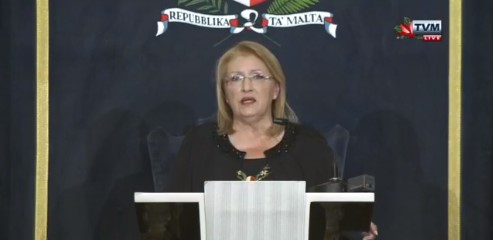Republic Day is seen as a bonus holiday in the run up to Christmas but in recent years it has become synonymous with the President’s speech. President Marie Louise Coleiro Preca addressed a number of current issues, from growing partisanship and the rule of law, to poverty and the proposed legalisation of prostitution.
Here are nine takeaways from her speech.
A year of joy and tears
“The past year brought us joy and satisfaction, but also concern and sadness. An eventful year which has made us proud of Malta’s economic growth which put it at the top of European economic success, the lowest unemployment rate ever and the introduction of more civil rights. On the other hand we witnessed the brutal murder of journalist Daphne Caruana Galizia which shook everyone and the consequences have left a damaging effect in Malta and abroad.”
Rule of law a deterrent against autocracy
“Rule of law is the deterrent against autocracy and abuse of power. I believe that the rule of law is as strong as the people’s recognition of it, and how much the people believe in it, embrace it and sustain it. If we as a people start believing that the right to rule trumps the rule of law then it will be very difficult to strengthen the rule of law and place it at the centre of democracy.”
Constitutional reform
“After meeting Malta’s political leaders and other people in the past months and years, I believe no more time should be wasted… Constitutional reform should encourage the people to participate fully and the process should be public and transparent…the Constitution is not merely a legal tool but it should serve as a living moral, ethical and legal guide.”
Independent institutions
“I expect the reform process to be an educational process for all. While the legal arguments need to be made, the renewal of the Constitution should reflect living in a vibrant democracy in the 21st century and how our democracy should be strengthened by having institutions which enjoy the trust of everyone.”
Journalists
“The work of journalists is indispensable in a democracy. I call on journalists to continue searching for the truth with great care and without being blinkered or partial. I tell journalists to take courage, and continue providing us with your service without fear and prejudice.”
Freedom of expression
“The freedom of expression is sacred in a democracy but it also comes with responsibilities, facts and not half-truths or speculation… I have noticed a budding culture where modern means of communication are used to humiliate and vilify people who are subjectively held as rivals just because they have different opinions. Unfortunately this culture of verbal violence is not only becoming an integral part of our everyday lives but it is being defended as a right to freedom of expression as if this culture is a democratic tool and something which every public person must suffer.”
Partisanship and critical thought
“Constructive criticism is essential in a democracy but rumours and insults undermine it. Unfortunately partisanship has seeped into our lives and it not only weakens critical thought but is also keeping dialogue at bay… when we call for national unity it doesn’t mean we have to have the same opinion or that we should close our eyes, ears or mouth or that we should stop thinking critically. Let’s not allow national unity to be threatened by making bad use of modern means of communication which are being used to divide instead of educate, inform and allow people to be free and sovereign citizens. Partisanship is making us weaker and dividing us into political tribes…”
Prostitution
“The more narratives I hear, some of which make one shudder, of the violent abuse of the female body, the more I am convinced, that with respect for Maltese women and girls, and with respect for the millions of women who are being violated in all ways, the progressive way forward, in this regard, is to decriminalise the victims. A number of progressive countries like Sweden, France, Iceland, Canada, and Ireland, during the discussion process about the future of the law on prostitution in their respective countries, decided not to take risks which could threaten the dignity of women, and therefore chose to go for full prevention, in favour of dignity… I appeal for an open national debate, where everyone can be heard. Let us not risk having contradictions in the sphere of civil rights in our country.”
Social Justice
“We must show solidarity with those who are living in poverty or at risk of poverty… We must also show solidarity with people who, in spite of being gainfully employed, are still poor or at risk of poverty. The agreement on the minimum wage is an important step that needs to be acknowledged and praised, but we must admit that we have not completely won the fight against precarity. This shows that social justice does not start with the distribution of wealth, but when justice is done; when workers should be adequately compensated for the work that they perform.”













